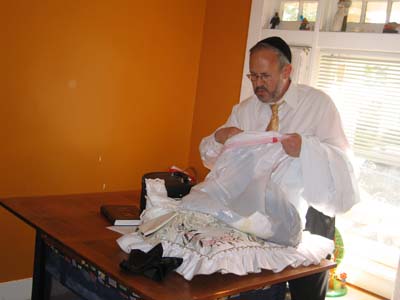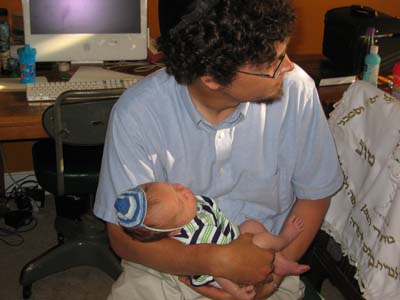68 bar falls 29.22 2mph SSW dew-point 62 Beltane, cloudy and rainy
Waxing Crescent of the Flower Moon (English)
Coming back from a journey throws the traveler back into daily life, matters that have been suspended on the road. This trip is no exception. Stefan’s wife, Lonnie, has surgery today for her adenocarcinoma. Kate’s got some problems at work. The tomato plant has not fruited. E-mail to catch up on. That pesky novel still calling to me. That sort of thing.
Let’s go back to the bris for a minute.
Here is the passage from the Torah that provides the theological rationale. It comes from Genesis 17:
1 When Abram was ninety-nine years old, the LORD appeared to him and said: “I am God the Almighty. Walk in my presence and be blameless. 2 Between you and me I will establish my covenant, and I will multiply you exceedingly.” 3 When Abram prostrated himself, God continued to speak to him: 4 “My covenant with you is this: you are to become the father of a host of nations. 5 2 No longer shall you be called Abram; your name shall be Abraham, for I am making you the father of a host of nations. 6 I will render you exceedingly fertile; I will make nations of you; kings shall stem from you. 7 I will maintain my covenant with you and your descendants after you throughout the ages as an everlasting pact, to be your God and the God of your descendants after you. 8 I will give to you and to your descendants after you the land in which you are now staying, the whole land of Canaan, as a permanent possession; and I will be their God.” 9 God also said to Abraham: “On your part, you and your descendants after you must keep my covenant throughout the ages. 10 This is my covenant with you and your descendants after you that you must keep: every male among you shall be circumcised. 11 Circumcise the flesh of your foreskin, and that shall be the mark of the covenant between you and me. 12 Throughout the ages, every male among you, when he is eight days old, shall be circumcised, including houseborn slaves and those acquired with money from any foreigner who is not of your blood. 13 Yes, both the houseborn slaves and those acquired with money must be circumcised. Thus my covenant shall be in your flesh as an everlasting pact. 14 If a male is uncircumcised, that is, if the flesh of his foreskin has not been cut away, such a one shall be cut off from his people; he has broken my covenant.”
Verse 10 and 14 have the operative language. (no pun intended) First, circumcision is a sign of the covenant between Yahweh and the descendants of Abraham and Sara. Second, Gabe, in order to not be cut off from his people had to have his foreskin circumcised.
In the living room of Jon and Jen’s home the mohel, Jay Feder, set his instruments on a wooden table top. I asked him questions and in the process he and I bonded over our shared knowledge. Educated in several yeshiva and, for the purpose of the bris, in Jerusalem, Jay, a full time jeweler, is a bright and learned man. He’s also very funny.

His shtick included these off hand remarks, “Oh, I see Adrian (a six month old boy) is here. I hope he doesn’t remember me!” When Jon laid Gabe on the pillow (where Jay performs the circumcision), he laid him with his head toward Jay, who said, “So. Do you like his nose? You’re ok with it shorter?” Jon turned Gabe around on the pillow. He then turned to Jon and said, “All right. The father performs the bris. Are you ready?” And so on.

The chair in front of the table with the cloth on it is the Elijah chair. I asked Jay the significance of the Elijah chair. He told me the story of Elijah. You may remember Elijah. He challenged Ahab and his priest, Obadiah, to a contest of efficacy, their gods, Baal and Ahserah, against his, Yahweh. Long story short. Yahweh sends down fire and burns a sacrifical bull, and not only the bull, but the altar as well. Baal and Asherah did not. Later on, however, Elijah complains to Yahweh that the people of Israel have not been keeping the covenant. After this comment, Elijah suffers a demotion and has to anoint his student, Elisha, as his successor.
Later, Elijah leaves earth for heaven in a whirlwind, on a chariot of fire. He is the only character in the Tanakh who does not die. Rabbinic scholars have made much of the study of Elijah and they conclude that Elijah became a perpetual witness to those events in Jewish ritual life that affirm the covenant. “The rabbis say this may be a reward or it may be a punishment.” Elijah’s chair, then, gives concrete expression to Elijah’s presence at this most basic of all affirmations of the Abrahamic covenant.

This is Jon (my stepson) and Gabe with his knitted yarmulke. I wore one, too, but I don’t have a picture. Asked about the significance of the yarmulke, Jay said, “There are many answers, but one I like is that it shows where we stop and God takes over.”

After the bris itself, Gabe received his Hebrew name, Gavriel. This is Jon and Jen, Ruth and Gabe with Jay giving Gabe several sips of sweet wine.
Why wine? Glad you asked, Jay said. “The body starts deteriorating from the moment of birth until it finally gives up and dies. It is the reverse in the spiritual life. As life goes on our spiritual life becomes richer and richer until we make the transition after death. Wine is one of the things we know that follows the same path. As it gets older and older, it gets better and better.”
One of the things I admire and respect about Judaism is its emphasis on home-based worship and ritual. This event sacralized Jon and Jen’s living room. While Jay sang some of the blessings, I saw many of Jon and Jen’s neighbors pass by on the street. It was an interesting blend of cultures.




